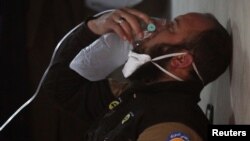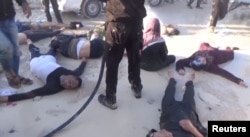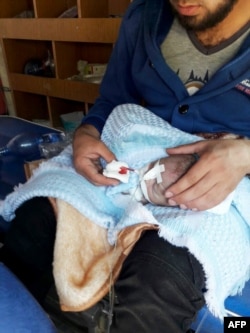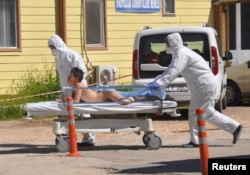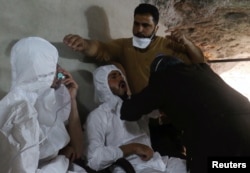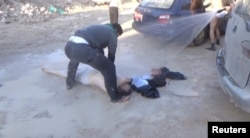U.S. officials are condemning a suspected chemical weapons attack in Syria that left scores dead, even while acknowledging the government of President Bashar al-Assad, widely thought to have carried out the strike, remains a "political reality" in the country.
"Today's chemical attack in Syria against innocent people, including women and children, is reprehensible and cannot be ignored by the civilized world," said White House press secretary Sean Spicer at a daily briefing on Tuesday.
The early-morning airstrike on a rebel-held neighborhood in northern Idlib province came days after top Trump administration officials, including Secretary of State Rex Tillerson, signaled that Assad's removal was no longer a U.S. priority.
Six-year civil war
The latest images of dead and dying civilians are prompting the Trump administration to reconsider its policy on Syria, where a six-year civil war has left hundreds of thousands dead.
On Tuesday, Spicer acknowledged it was not in the "best interest" of the Syrian people to leave Assad in power, but said U.S. options were limited. "There's not a comfort level with Assad. I think it's a political reality," he said.
Spicer said that while the U.S. had "several opportunities in the past several years to look at regime change [in Syria], the landscape is fundamentally different today."
"That said, the president has made clear in the past and will reiterate today that he is not going to telegraph what we're going to do, but rest assured we will continue to have that discussion internally and with our allies around the globe," he added.
Tillerson did not comment on the strike when asked about it Tuesday at an event with Jordan's visiting King Abdullah. However, he later released a statement saying it showed that Assad operates with "brutal, unabashed barbarism," and blaming Russia and Iran for failing to rein in the Syrian leader.
"We call upon Russia and Iran, yet again, to exercise their influence over the Syrian regime and to guarantee that this sort of horrific attack never happens again. As the self-proclaimed guarantors to the cease-fire negotiated in Astana, Russia and Iran also bear great moral responsibility for these deaths," Tillerson said.
Deadly chemical attack
The chemical weapons attack was thought to be the deadliest of its kind in Syria since 2013, when a toxic gas attack on a Damascus suburb killed as many as 1,500 civilians. That attack crossed a "red line" set by former President Barack Obama, who threatened but did not follow through with retaliatory airstrikes against Assad.
Instead, Obama helped negotiate a deal whereby Syria would give up its chemical weapons. Sporadic chemical weapons attacks have since continued, some with less potent agents.
On Tuesday, Spicer blamed the latest attack on the "weakness and irresolution" of the Obama administration. "President Obama said in 2012 that he would establish a red line against the use of chemical weapons and then did nothing," Spicer said.
President Donald Trump has ramped up airstrikes against Islamic State fighters in Syria and Iraq but has refused to continue Obama's policy of arming rebels fighting Assad. Instead, Trump is said to be open to working with Russia, which is intervening on the side of Assad.
Trump's approach to Syria has attracted critics on both sides of the political spectrum.
Senator John McCain, who has pushed for greater U.S. involvement in Syria, said the latest chemical weapons attack represented "another disgraceful chapter in American history."
"Bashar Assad and his friends, the Russians, take note of what Americans say. I'm sure they took note of what our secretary of state said just the other day," the Arizona Republican said. "I'm sure they're encouraged to know that the United States is withdrawing and seeking some kind of new arrangement with the Russians."
Democratic Senator Ben Cardin of Maryland also urged a more robust international response following the attack.
"Russia is enabling the Assad regime to break any form of standards as far as use of chemical weapons, and now women and children again have been murdered as a result of the Assad regime's commission of war crimes," Cardin said.
Syrian activists
Spicer on Tuesday said he did not see any correlation between the timing of the chemical weapons attack and the Trump administration's change of policy on Assad. But many Syrian activists see it differently.
"This is the political reality that comes out of accepting ... the regime's survival," said Ammar Abdulhamid, a Syrian-American pro-democracy activist who lives in Maryland. "The regime will now kill on a larger scale and with greater impunity."
But those hoping the White House will change its Syria policy as a result of such attacks may be waiting for a while, said Jim Phillips, senior research fellow for Middle Eastern affairs at the conservative Heritage Foundation.
"I'm not sure the Trump administration would feel that kind of pressure," Phillips said. "I think they've definitely elevated the war against ISIS [an acronym for IS] and al-Qaida above the priority of removing the Assad regime."
VOA's Nike Ching and Cindy Saine contributed to this report.




